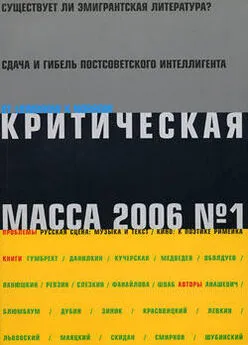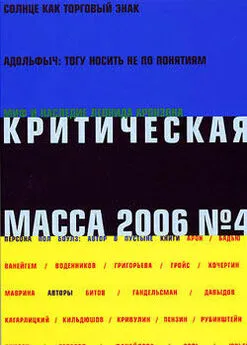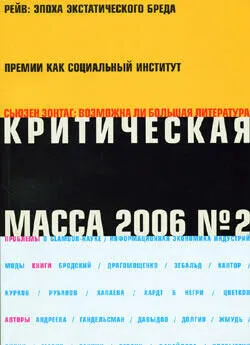Филипп Болл - Критическая масса, как одни явления порождают другие
- Название:Критическая масса, как одни явления порождают другие
- Автор:
- Жанр:
- Издательство:Гелеос
- Год:2008
- ISBN:978-5-8189-1442-8
- Рейтинг:
- Избранное:Добавить в избранное
-
Отзывы:
-
Ваша оценка:
Филипп Болл - Критическая масса, как одни явления порождают другие краткое содержание
Эти вопросы волновали человечество на протяжении веков. Томас Гоббс, Адам Смит, Иммануил Кант, Огюст Конт, Джон Стюарт Милль, Карл Маркс и другие философы рассматривали их с различных политических позиций. Однако им недоставало инструментов, которыми располагает современная физика.
Филип Болл, известный британский ученый, редактор-консультант журнала Nature, показывает, как, применяя эти инструменты, можно понять многие аспекты поведения человеческих масс. Как только человек осознает, что большинство его решений принимается под влиянием других людей, перед ним открывается неожиданная и даже, возможно, тревожная предсказуемость законов развития общества.
Настоящее издание может рассматриваться и как справочник, и как книга для чтения, рассчитанная на самый широкий круг читателей.
Критическая масса, как одни явления порождают другие - читать онлайн бесплатно полную версию (весь текст целиком)
Интервал:
Закладка:
3 Castells, p. 1.
4 Ibid., p. 36.
5 Ibid., р. 282.
6 S.Dalzell, quoted in J.Naughton (1999). A Brief History of the Future, pp. 190-91. Wei-denfeld & Nicolson, London. See www2.epic.org/cda/cda_dc_opinion. html.
7 Ibid., p. 192.
8 T.Berners-Lee (1990). «Information management: a proposal,» CERN Internal Report, May, p. 9. See www.w3.org/History/1989/proposal. html.
9 FBI Definitions, U.S. Code of Federal Regulations 28, sec. 0.85.
10 A.-L. Barabasi (2003). «We’re all on the Grid together.» New York Times, 16 August.
11 Ibid.
12 A.-L. Barabasi (2002). Personal communication.
13 W.B. Arthur, S.N. Durlauf & D.A. Lane (1997). The Economy as а Complex Evolving System II, p. 9. Addison-Wesley, Reading, Mass.
ГЛАВА 17. ПОРЯДОК В ЭДЕМЕ
ЭПИГРАФЫ
Sir William Temple (1751). «An Essay upon the Origin and Nature of Government.» Works I, p. 99. Quoted in the introduction to T.Hobbes, Leviathan, ed. C.B. Macpherson, p. 61.
John Locke (1690). Essay on Civil Government. In Two Treatises of Government, ed. M.Goldie, p. 118. J.M. Dent, London, 1993.
Ian Hay (1916). The First Hundred Thousand, pp. 224-25. William Blackwood, London.
1 S. Freud (1930). Civilization and Its Discontents, pp. 32-33. Hogarth Press, London, 1973.
2 J. Locke (1690). Second Treatise on Government. In Two Treatises of Government, 2nd ed., ed. P Laslett, p. 433. Cambridge University Press, Cambridge, 1970.
3 K. Popper (1997). The Lesson of This Century, p. 35. Routledge, London.
4 Freud, p. 60.
5 Locke (ed. Goldie), p. 124.
6 Ibid., p. 117.
7 Ibid., p. 124.
8 A.A. Cooper, 3rd Earl of Shaftesbury (1711). Chamcteristicks of Men, Manners, Opinions, Times, ed. P. Aynes, vol. ii, p. 67 (Wyat, London). Clarendon Press, Oxford, 1999.
9 Genesis 9:6.
10 Locke, p. 178.
11 J.S. Mill (1859). On Liberty, ed. G.Himmelfarb, p. 68. Penguin, London, 1985.
12 J.S. Mill (1861). «Utilitarianism.» In J.S. Mill and J.Bentham (1987). Utilitarianism and Other Essays, ed. A. Ryan, p. 278. Penguin, Harmondsworth, England.
13 J.-J. Rousseau (1754). «Discourse on Inequality.» Quoted in B.Russell (1984). A History of Western Philosophy, p. 663. Unwin Paperbacks, London.
14 C Darwin (1871). The Descent of Man, and Selection in Relation to Sex, p. 64. John Murray, London, 1874.
15 T.Hobbes (1651). Leviathan, ch. 51.
16 R.Kagan (2002). «Power and weakness.» Policy Review 113, June & July (http://www. policyreview.org).
17 E.Hobsbawm (1994). Age of Extremes, pp. 24-26. Abacus, London.
18 G.Dugdale (1932). Langemarck and Cambrai, p. 94. Wilding & Son, Shrewsbury.
19 G.B. Cobb (1916). Stand to Arms, p. 74. Wells Gardner, Darton, London.
20 T.Ashworth (1980). Trench Warfare 1914-1918: The Live and Let Live System, p. 144. Holmes & Meier, New York.
21 Hobbes, p. 190.
22 Ibid.
23 R. Axelrod (1984). The Evolution of Cooperation, p. 124. Basic Books, New York.
24 Popper, p. 70.
25 Pericles’ funeral oration is recounted by Thucydides in History of the Peloponnesian War, bk. II. This paraphrase is given by Popper, p. 72.
26 Popper, pp. 36-37.
ГЛАВА 18. ПОБЕДА ПАВЛОВА
ЭПИГРАФЫ
Niccolo Machiavelli (1513). The Prince, trans. G.Bull, ch. XV, p. 91. Penguin, London, 1981.
Kenneth N. Waltz (1954). Man, the State, and War, p. 108. Columbia University Press, New York.
Karl Popper (1988). «Reflections on the theory and practice of the democratic state,» talk in Munich, 9 June. In The Lesson of This Century, p. 79. Routledge, London, 1997.
1 Deuteronomy 19:19-21.
2 M.A. Nowak & K.Sigmund (1992). «Tit for tat in heterogeneous populations.» Nature 355, 250-253.
3 E.Burke (1770). «Thoughts on the Causes of the Present Discontents.» Quoted in M.J. Hinich & M. C Munger (1997), Analytical Politics, p. 136. Cambridge University Press.
4 Popper (1997). The Lesson of This Century, p. 49. Routledge, London.
5 Ibid., p. 55.
6 H.Kahn (1984). Thinking About the Unthinkablem the 1980s, p. 59. Simon & Schuster, New York.
7 B.Skyrms (1996). Evolution of the Social Contract, p. 24. Cambridge University Press.
8 Pentagon Papers, ed. N.Sheehan & E.W. Kenworthy (1971), p. 432. Times Books, New York.
9 K.Sigmund (1995). Games of Life, p. 191. Penguin, London.
1(l R. Axelrod (1984). The Evolution of Cooperation, p. 184. Basic Books, New York.
11 Quoted in F.Goodall (1997). A Question of Conscience, p. 198. Sutton Publishing Group, Stroud, U. K.
12 Quoted in Goodall, p. 199.
13 Popper, p. 91.
ГЛАВА 19. ВПЕРЕД, К УТОПИИ?
ЭПИГРАФЫ
Ralph Waldo Emerson (1860). The Conduct of Life, p. 176. J.M. Dent, London, 1908. George Lundberg (1939). Foundations of Sociology. Macmillan, London. In R.Bierstedt, ed (1959). The Making of Society, p. 518. Random House, New York.
Herbert Simon (1996). The Sciences of the Artificial, 3rd ed., p. 139. MIT Press, Cambridge,
Mass. Julian Barnes (1989). A History of the World. Jonathan Cape, London.
1 J.Carey (1999). The Faber Book of Utopias, p. xii. Faber and Faber, London.
2 Quoted in F.A. Hayek (1962). The Road to Serfdom, p. 18. Routledge, London.
3 J.S. Mill (1843). A System of Logic, book 6. In Bierstedt, p. 205.
4 G.Simmel (1908). The Sociology qf Georg Sirnnel, ed. and trans. K.H. Wolff. Free Press, Glencoe, 111., 1950.
5 R.E. Park (1927). «Human nature and collective behavior.» American Journal of Sociology XXXII, no. 5,733.
6 A.Smith (1776). An Inquiry into the Nature and Causes of the Wealth of Nations, ed. L. Dickey, p. 11. Hackett, Indianapolis, 1993.
7 B.Mandeville (1705). Fable of the Bees. Quoted in B. Willey (1940), The Eighteenth Century Background, p. 96. Columbia University Press, New York.
8 J. Swift (1729). A Modest Proposal for Preventing the Children of Poor People in Ireland from Being a Burden to Their Parents or Country and for Making Them Beneficial to the Public. In Selected Prose Works of Jonathan Swift, ed. J. Hayward (1949), p. 430. Cresset Press, London.
9 L.Mumford (1938). The Culture of Cities, p. 93. Seeker & Warburg, London.
10 Mill, Logic. In Bierstedt, p. 203.
11 A.Ferguson (1766). Institutes of Moral Philosophy. Quoted in G.Bryson (1945), Man and Society, p. 35. Princeton University Press, Princeton, N. J.
12 A.Ferguson (1767). An Essay on the History of Civil Society, ed. D.Forbes, p. 122. Edinburgh University Press, 1966.
13 R.W. Emerson (1844). «On Politics.» In The Essays of Ralph Waldo Emerson, p. 325. Grant Richards, London, 1903.
14 K.Marx (1845). Theses on Feuerbach, no. 11. Published and edited by F.Engels, as an appendix to F.Engels (1888), Ludwig Feuerbach und der Ausgang der Klassischen Deutschen Philosophic. J.H. W. Dietz, Stuttgart.
15 P.Ormerod (1998). Butterfly Economics, p. 182. Faber & Faber, London.
16 R. Olson (1990). Science Deified and Science Defied , vol. 2, pp. 210-11. University of California Press, Berkeley, Calif.
17 Cicero, De Legibus. In Bierstedt, p. 41.
18 Aristotle, Politics, trans. W.D. Ross. In Bierstedt, p. 24.
t9St. Thomas Aquinas (c. 1259). On the Governance of Rulers, trans. G.B. Phelan. In Bierstedt, p. 52.
20 Ibid., p. 53.
21 Hobbes, Leviathan, p. 185.
22 Smith, Wealth of Nations, p. 130.
23 F. von Hayek (1944). The Road to Serfdom, p. 27. Routledge, London, 1962.
24 Ibid., p. 14.
25 T C.Scheuing (1978). Micromotives and Macrobehavior, pp. 127-28. W.W. Norton, New York.
26 Ibid., p. 19.
27 K.Malik (2000). «Natural science.» Prospect, August/September.
28 Mill, Logic. In Bierstedt, p. 209.
29 F.Giddings (1924). The Scientific Study of Нитап Society. In Bierstedt, p. 362.
Филип Болл
Критическая масса
Как одни явления порождают другие
Издатель Г. Бушева Оформление обложки С. Артамонова Верстка И. Кобзева Корректоры Л. Доценко, М. Козлова
Подписано в печать 01.07.08. Формат 70x100 !/ 16Тйраж 5000 экз. Заказ № 8379.
Общероссийский классификатор продукции ОК-005-93, том 2; 953000 — книги, брошюры
ЗАО «Издательский дом «Гелеос»
115093, Москва, Партийный переулок, 1 Тел.: (495) 785-0239. Тел./факс: (495) 951-8972 www.geleos.ru
ЗАО «Читатель»
115093, Москва, Партийный переулок, 1 Тел.: (495) 785-0239. Тел./факс: (495) 951-8972
ООО «Нью Лайн Продакшн»
115093, Москва, Партийный переулок, 1 Тел.: (495) 785-0239. Тел./факс: (495) 951-8972
Отпечатано в ОАО "Тульская типография".
300600, г. Тула, пр. Ленина, 109.

1
Инквизиция была учреждена задолго до Реформации — в XIII веке (прим. ред.).
2
«И все-таки она вертится!» (прим. ред.).
3
В Англии обладателей дворянского титула принято называть по имени, добавляя его к титулу (прим. ред.).
4
Некоторым читателям может показаться, что нижеследующая цитата плохо вписывается в контекст. Для гимнастики ума предлагаем им самим проникнуть в потаенный смысл высказывания Декарта: «And as a clock, composed of wheels and counterweights, observes not the laws of nature when it is ill made, and points out the hours incorrectly, than when it satisfies the desire of the maker in every respect; so likewise if the body of man be considered as a kind of machine, so made up and composed of bones, nerves, muscles, veins, blood, and skin, that although there were in it no mind, it would still exhibit the same motion which it at present manifests voluntarily». Справедливости ради заметим, что Декарт писал не по-английски, так что мы имеем дело с переводом. А читатель — с переводом перевода (прим. ред.).
5
Автор использует термин «power», который имеет в ряду прочих значения «могущество», «власть», «сила», не являющиеся в русском языке полностью синонимичными. Эт» создавало определенные проблемы при переводе, в зависимости от контекста использовалось то или иное значение (прим. ред.).
Читать дальшеИнтервал:
Закладка:








